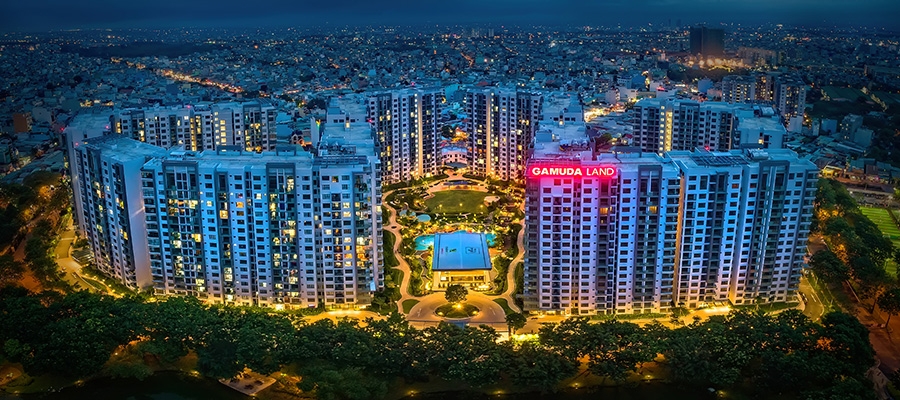Vietnam – home away from home in hard times for Gamuda Land
COVID-19 has been one of the determining events for the world this year, leaving distressed projects in its wake. How did Gamuda Land experience the pandemic?
 |
| Angus Liew, general director of Gamuda Land (HCMC) |
Throughout history, we have faced several pandemics like the Spanish flu, ebola, and SARS. However, because of advancements in technology and transportation, there have been revolutionary improvements in connectivity, allowing for the pandemic to spread at an unprecedented rate and become a major challenge for humankind.
However, Vietnam has been controlling this pandemic effectively – and whoever can hold the pandemic back will have a better chance at development than others.
Vietnam’s success with the pandemic has cushioned a lot of the impact, but with the global economy affected, the demand for housing also took a dip.
In comparison with other countries like Malaysia, Vietnam still has strong demand. People are also looking more at hygiene and facilities for their living spaces, so projects with good master planning and infrastructure will thrive.
These trends will initially be a challenge for most companies, but later on, we will value them as an opportunity to take a turn towards sustainability.
How will Vietnam's new international trade agreements affect mergers and acquisitions (M&A) activities by foreign real estate developers in Vietnam?
All these international trade agreements have made Vietnam an appealing destination for manufacturers, who will draw along many other trading companies.
This will raise the demand for accommodation in Vietnam while at the same time improving the general income level of Vietnamese people, raising the demand for a better living environment – and we are here to meet it.
At the same time, more and more developers are touching down in the market while local developers are growing. This will intensify competition for land banks and make M&A deals more of a challenge. However, overall, the international trade agreements will bring good opportunities for both Vietnamese and foreign companies.
What attracts foreign investors to Vietnam’s real estate M&A market?
The whole world is looking at COVID-19 at the moment, assessing its impact on the world and domestic economies. Fortunately, Vietnam has managed to keep the pandemic under control so far, which has made a star in the global economy. While most others are looking at a reduction in their GDP, Vietnam is still forecast for positive growth. This brings Vietnam ahead of many other countries. I think in the coming years Vietnam will remain very attractive for foreign investors, many of whom will choose M&A deals to enter the market.
With its host of international trade agreements, especially the EU-Vietnam Free Trade Agreement, Vietnam is becoming a key destination for European manufacturers and companies looking to set up factories and operations bases. This will further raise foreign demand for accommodation, bolstering the entire real estate market.
Additionally, the Vietnamese government has recently permitted foreigners to buy houses and apartment units. If this is extended to second homes, many European buyers will come to retire in Vietnam which is offering stable politics, good climate, and a growing economy. We can follow the example of Thailand, which is very successful in attracting European and Asian buyers and investors.
The investment from foreign developers and buyers would also improve local income levels and, in turn, improve the demand for better housing and living environments, which will improve investment into this field.
We believe M&A will accelerate in Vietnam next year when foreigners can once again access the country.
What are the biggest difficulties that arise during an M&A deal between foreign and Vietnamese partners?
I think the biggest problem is the understanding of the law. Vietnamese laws are quite different from those in other countries. Foreign investors are, therefore, prone to misunderstandings or misinterpretations.
However, the Vietnamese government has done a tremendous job of improving and completing its legal system to create better conditions for foreign investors. The improvements continue to this day to align the laws with present realities and draw in more foreign investors.
How is the supply for M&A deals in Vietnam?
At the moment, there are not all that many offers in the real estate market.
Land funds inside the city are limited – especially large areas that can accommodate entire townships are virtually non-existent. Due to improvements in the infrastructure system, satellite areas and provinces neighbouring the biggest cities are a rising choice among developers.
Another important thing to look out for is the first metro line of Ho Chi Minh City which will soon be put into operation. This new key transport infrastructure will appreciate land valuation along the entire line, presenting good opportunities for M&A deals.
How can developers make M&A an effective strategy to restructure and reposition their portfolio?
We actually began Celadon City with an M&A deal with Saigon Thuong Tin Real Estate JSC (Sacomreal) many years ago and now Gamuda Land holds all the stakes.
Companies like Gamuda Land have been here for more than 10 years, so we understand the laws and regulations, but it is very difficult for the new ones. We have an edge over many other companies.
Foreigners have expertise and capital, while the Vietnamese partners know the local regulations. Foreign partners can use their strengths in planning urban areas and can also help secure cheaper funding from overseas, which makes them a desirable partner for local developers.
The key issue is to find a mutually acceptable working arrangement between the two partners. It is of utmost importance that the two sides must share a vision and development strategy for their developments in Vietnam.
Vietnamese partners have grown stronger, more capable, and richer in the past years through M&A. Many of them have managed to improve their reputation and brand image, not to mention capacity. Domestic partners are now emerging as tough competitors in M&A.
 |
Land prices in Vietnam are skyrocketing. How does this impact foreign investors’ M&A decisions in Vietnam?
Most M&A deals need time to conduct due diligence. It is often the case that by the time this is completed, prices have already risen. This is not healthy for the industry.
However, during COVID-19, prices have stabilised. This presents a good opportunity for capable developers.
What is Gamuda Land’s investment strategy here?
As we have been here for more than a decade now, we are familiar with the local culture and regulations, and are open to M&A deals or joint ventures.
M&A is an important strategy for us, but we need to look at the merits of each specific opportunity before we can decide which investment method – M&A, joint venture, or direct investment – is the best fit.
We will continue to grow in Vietnam, as we already consider the country our second base after our headquarters in Malaysia.
When it comes to M&A, we are not only acquirers but also acquirees. In our Celadon City, we are offering some schools for sub-investors to jump into under the M&A channel. We welcome good partners to join us in this township as we cannot develop everything by ourselves.
Previously, we have reached an agreement with AEON Mall regarding the commercial and trade centre and the Asian International School for education. Many other opportunities remain for sub-investors.
Gamuda Land has two of the biggest townships in Vietnam. With land banks in major cities limited, do you plan to expand to neighbouring areas?
Ho Chi Minh City and surrounding areas will eventually merge into one giant metropolis where people from other provinces will come to work. This is already quite common in Malaysia and we have already seen this in Hanoi, where people travel across provinces in their daily commute and this will be a trend in Ho Chi Minh City, too.
We are discussing joint projects with several companies to find suitable matches. We are also looking to acquire more land. We will also consider neighbouring and satellite provinces such as Binh Duong, Dong Nai, and Long An in the south and Hung Yen, Haiphong, and Phu Tho in the north.
What the stars mean:
★ Poor ★ ★ Promising ★★★ Good ★★★★ Very good ★★★★★ Exceptional
Related Contents
Latest News
More News
- South Korean VC completes buyout of Chicken Plus Vietnam (February 25, 2026 | 07:55)
- Marico buys 75 per cent of Vietnam skincare startup Skinetiq (February 10, 2026 | 14:44)
- Mitsubishi acquires Thuan An 1 residential development from PDR (February 09, 2026 | 08:00)
- KKR and Singtel step up data centre investment in Southeast Asia (February 06, 2026 | 13:09)
- New rules ease foreign access to Vietnam equities (February 05, 2026 | 17:29)
- Vietnam’s IFC creates bigger stage for M&As (February 01, 2026 | 08:16)
- Game startup Panthera raises $1.5 million in seed funding (January 29, 2026 | 15:13)
- Cool Japan Fund transfers shares of CLK Cold Storage (January 28, 2026 | 17:16)
- Nissha acquires majority stake in Vietnam medical device maker (January 26, 2026 | 15:40)
- BJC to spend $723 million acquiring MM Mega Market Vietnam (January 22, 2026 | 20:29)

 Tag:
Tag:
















 Mobile Version
Mobile Version